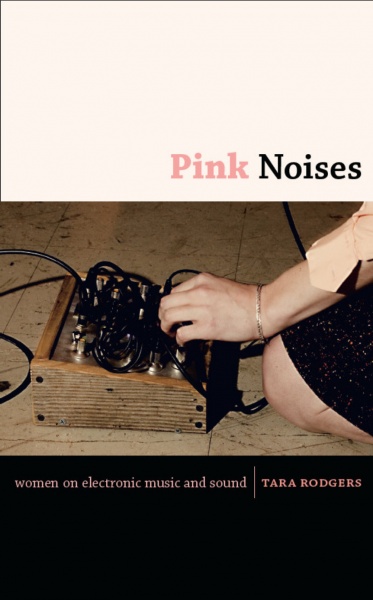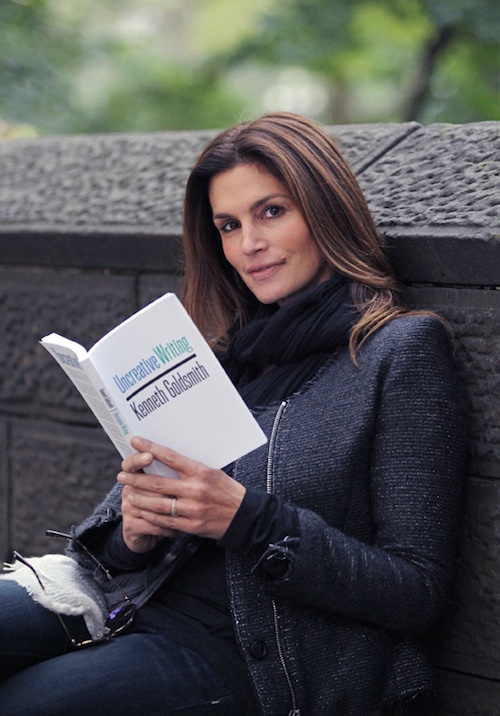Tara Rodgers: Pink Noises: Women on Electronic Music and Sound (2010)
Filed under book | Tags: · composing, electronic music, feminism, gender, music, performance, sound, sound art, technology, voice, women

Pink Noises brings together twenty-four interviews with women in electronic music and sound cultures, including club and radio DJs, remixers, composers, improvisers, instrument builders, and installation and performance artists. The collection is an extension of Pinknoises.com, the critically-acclaimed website founded by musician and scholar Tara Rodgers in 2000 to promote women in electronic music and make information about music production more accessible to women and girls. That site featured interviews that Rodgers conducted with women artists, exploring their personal histories, their creative methods, and the roles of gender in their work. This book offers new and lengthier interviews, a critical introduction, and resources for further research and technological engagement.
Contemporary electronic music practices are illuminated through the stories of women artists of different generations and cultural backgrounds. They include the creators of ambient soundscapes, “performance novels,” sound sculptures, and custom software, as well as the developer of the Deep Listening philosophy and the founders of the Liquid Sound Lounge radio show and the monthly Basement Bhangra parties in New York. These and many other artists open up about topics such as their conflicted relationships to formal music training and mainstream media representations of women in electronic music. They discuss using sound to work creatively with structures of time and space, and voice and language; challenge distinctions of nature and culture; question norms of technological practice; and balance their needs for productive solitude with collaboration and community. Whether designing and building modular synthesizers with analog circuits or performing with a wearable apparatus that translates muscle movements into electronic sound, these artists expand notions of who and what counts in matters of invention, production, and noisemaking. Pink Noises is a powerful testimony to the presence and vitality of women in electronic music cultures, and to the relevance of sound to feminist concerns.
Interviewees: Maria Chavez, Beth Coleman (M. Singe), Antye Greie (AGF), Jeannie Hopper, Bevin Kelley (Blevin Blectum), Christina Kubisch, Le Tigre, Annea Lockwood, Giulia Loli (DJ Mutamassik), Rekha Malhotra (DJ Rekha), Riz Maslen (Neotropic), Kaffe Matthews, Susan Morabito, Ikue Mori, Pauline Oliveros, Pamela Z, Chantal Passamonte (Mira Calix), Maggi Payne, Eliane Radigue, Jessica Rylan, Carla Scaletti, Laetitia Sonami, Bev Stanton (Arthur Loves Plastic), Keiko Uenishi (o.blaat)
Publisher Duke University Press, 2010
ISBN 0822346737, 9780822346739
322 pages
Review (Tiffany Naiman, Ethnomusicology Review)
Review (Mary Simoni, Computer Music Journal)
Review (Betsey Biggs, Women and Music: A Journal of Gender and Culture)
Download (removed on 2013-12-13 upon request of the publisher)
View online (partial version, HTML, added on 2014-1-14)
Kenneth Goldsmith: Uncreative Writing: Managing Language in the Digital Age (2011)
Filed under book | Tags: · appropriation, authorship, conceptual writing, concrete poetry, data, language, literary theory, literature, poetry, technology, text, uncreative writing

“Can techniques traditionally thought to be outside the scope of literature, including word processing, databasing, identity ciphering, and intensive programming, inspire the reinvention of writing? The Internet and the digital environment present writers with new challenges and opportunities to reconceive creativity, authorship, and their relationship to language. Confronted with an unprecedented amount of texts and language, writers have the opportunity to move beyond the creation of new texts and manage, parse, appropriate, and reconstruct those that already exist.
In addition to explaining his concept of uncreative writing, which is also the name of his popular course at the University of Pennsylvania, Goldsmith reads the work of writers who have taken up this challenge. Examining a wide range of texts and techniques, including the use of Google searches to create poetry, the appropriation of courtroom testimony, and the possibility of robo-poetics, Goldsmith joins this recent work to practices that date back to the early twentieth century. Writers and artists such as Walter Benjamin, Gertrude Stein, James Joyce, and Andy Warhol embodied an ethos in which the construction or conception of a text was just as important as the resultant text itself. By extending this tradition into the digital realm, uncreative writing offers new ways of thinking about identity and the making of meaning.”
Publisher Columbia University Press, 2011
ISBN 0231149913, 9780231149914
272 pages
Interviews with author: CUP blog (2011), Mark Allen (The Awl, 2013).
Reviews: Andrea Quaid (American Book Review, 2011), Sam Rowe (Full Stop, 2011), Stephen Burt (London Review of Books, 2012), Amelia Chesley (J Electronic Publishing, 2012), Michael Jauchen (HTMLGiant, c2012), Grant Matthew Jenkins (James Joyce Quarterly, 2012), Andrew McCallum (English in Education, 2013).
Commentary: Special section of American Book Review dedicated to uncreative writing (ed. Doug Nufer, 2011).
HTML (added on 2016-03-01)
EPUB (updated on 2015-10-9)
Friedrich A. Kittler: Literature, Media, Information Systems: Essays (1997)
Filed under book | Tags: · information theory, literary theory, literature, media theory, philosophy, technology

An early collection of the writings of Friedrich Kittler in English translation.
The following essays are included: “Gramophone, Film, Typewriter”, “Dracula’s Legacy”, “Romanticism–Psychoanalysis–Film: A History of the Double”, “Media and Drugs in Pynchon’s Second World War”, “Media Wars: Trenches, Lightning, Stars”, “The World of the Symbolic–A World of the Machine”, “There Is No Software” and “Protected Mode”.
Edited and Introduced by John Johnston
Publisher OPA, Amsterdam, 1997
ISBN 9057010712
192 pages
PDF, PDF (updated on 2017-5-2)
Comments (5)
